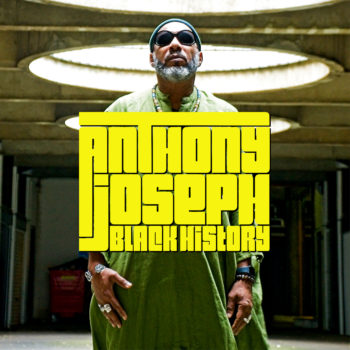
New single Black History Out Now
taken from forthcoming album – “Rowing Up River To Get Our Names Back” Out early 2025
The idea behind Black History is that the stories of Black families and our traditions are also a part of our history. Our history is not all captured in books or scholarship, it’s also within our familial lineage. The poem is about the house parties my family loved when I was growing up in Trinidad, and the music feels very much like the kind of music we’d dance. There would be parties for christenings, weddings, birthdays, and we’d all gather at someone’s house and eat, laugh and dance. Our DJ was DJ Champ, who was my great aunts husband, and he had one turntable but the music flowed as if he was mixing. He introduced me to a lot of great funk and reggae and I probably started collecting records because of his influence. The poems talks about the women in the family; my aunt Ursula, who would sing for us, my great aunts, my grandmother, all these women would transform into ravers at these parties, smoking and drinking hard. So the poem tells their stories and the relationships between them which connects us to my great-great Grandmother who came to Trinidad during the time of slavery.
Listen here:
New single out now – Listen now: https://idol-io.ffm.to/blackhistory-2
Lyrics:
One turntable was all DJ Champ had.
The fade was to wait.
Two big speaker box for the boom.
Two tweeters
hung like bees on wire above the front door.
Sacred hearted Jesus
Mister Clarence dancing to Lord Nelson’s ‘Night Train’,
— the only glimpse we ever stole of him
in this motion.
With his head up and easy,
holding out his glass of Whiteways of Whimple
to the side, so it don’t spill when he slide
and spin on his heel.
And there were full women in the kitchen
smoking filterless Broadways and drinking Scotch straight.
Tanty Ursula was young then, among them,
strong and long before her stroke,
she had plenty verve.
Ursula would stand unsolicited
and sing out with her tremulous voice.
Sing, ‘My Way’ or ‘Misty.
Wavering between keys but upwards she drove,
into the wild arc
of her highest note.
Black History
Black History
Black History
Black History
Now, her aunt Zeen had been in Boston since 1972.
And Zeen’s blood was close to her skin.
She would throw her head back an’ laugh.
Blow smoke and cuss hard, she could break
a young man’s carapace.
She could drink hard rum and linger long
after grog had beat up the competition.
She drank men silly,
till they floated up and sighed.
Zeen would fry chicken by the bucket,
she would curry a cast of river crabs,
soup up some bull foot soup.
Fridays on Dorchester Avenue.
Sons would bring their wives
from New England.
Yankee life. Varsity sweaters.
Plastic shoes and cheap perfume.
Black History
Zeen in Boston working as a nurse.
At night she working for the sanitation department.
But when she threw a party, she would hire a DJ,
an’ when music leggo — bram —
she would pull people up to dance.
Black History
Black History
Black History
Black History
Writing on the same letter Nita sent,
and that wranglement didn’t ease
until age and diabetes start to creep
into their lives.
Black History
Black History
Now, their mother
Ma, Nobelta Lezama,
my great grand mother,
she lived to be at 102,
after outliving two husbands
after giving birth to eight children
and walking eight miles from hillside to town
to sell mangoes in Central Market.
She could slap harsh cards down
in late night gambling games.
She drank her coffee black and strong
Ma Nobelta’s mother
was Ma Marie, born of Black Africa
— historical mystery —
that must have been sometime in the 1860s,
this was near after slavery,
and the village gave her their secrets
for safekeeping, to be unravelled through generations
and generations, and generations
of Black history
and do this all
without Western belief in the afterlife
But from the root set in sweet mud.
Ma Nobelta’s mother
was Ma Marie, born of Black Africa
— historical mystery —
that must have been sometime in the 1860s,
this was near after slavery,
and the village gave her their secrets
for safekeeping, to be unravelled through generations
of Black history
Credits:
Anthony Joseph – Vocals
Dan See (aka Seezus) – Drums
Dave Okumu – Bass guitar, guitars, Fender Rhodes, synthesiser, percussion, programming, background vocals
Aviram Barath – synthesiser
Nick Ramm – Fender Rhodes
Eska (aka Magic Woman) – Background vocals
Colin Webster – Saxophones
James Wade Sired – Trombone
Engineered by Nick Powell (aka Pickles) and Dave Okumu
Recorded at Unit 9
Taken from upcoming album “Rowing Up River To Get Our Names Back” out early 2025
© Copyright: 2024 Heavenly Sweetness
℗ Production: 2024 Heavenly Sweetness